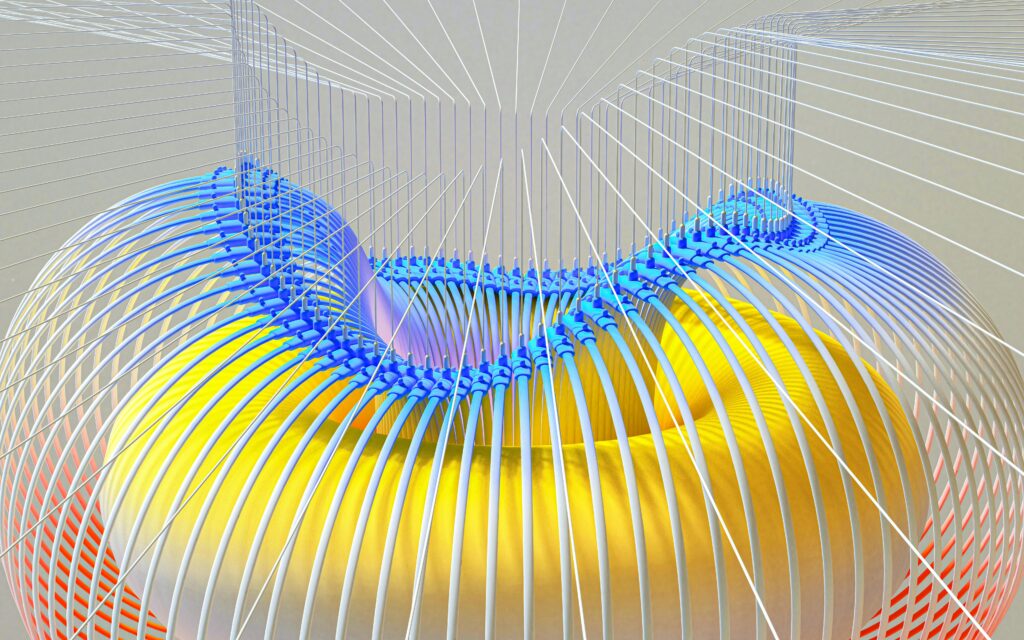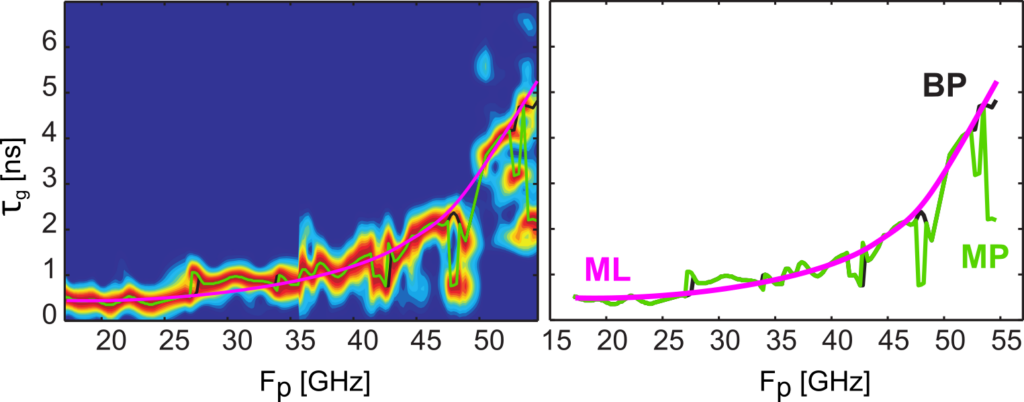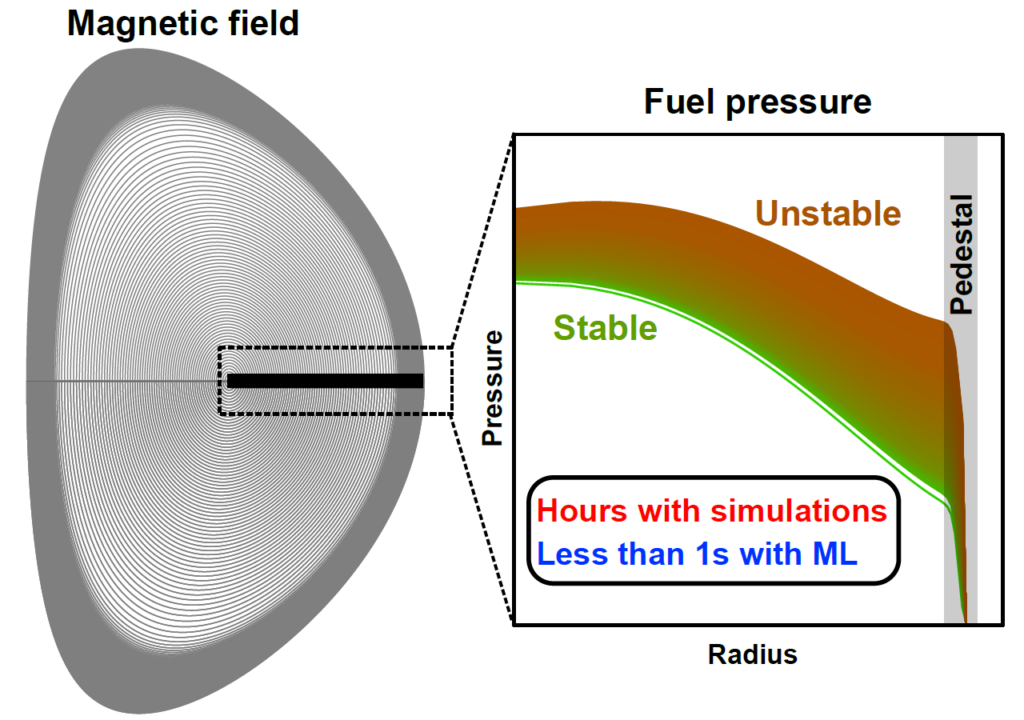Fusion energy promises to deliver safe, sustainable, and low-carbon baseload power, complementing other clean energy sources like solar and wind.
To achieve this, we need to address complex physics and engineering challenges, including understanding the collective movements of charged particles in magnetic fields, mitigating disruption events, analysing material erosion effects, and processing data rapidly enough for use in control loops. Artificial Intelligence and Machine Learning offer new opportunities to deepen our understanding of these phenomena.

Building on the world’s largest dataset
“With new research projects on Artificial Intelligence and Machine Learning, EUROfusion aims to accelerate progress towards fusion energy and support the ongoing efforts in its work packages”, explains Sara Moradi of the EUROfusion Programme Management Unit. “Machine learning and Artificial Intelligence are powerful tools for extracting insight from data, uncovering patterns and suggest control schemes that are too computationally intensive to identify with traditional computer models.”
EUROfusion’s extensive dataset of fusion experiments spans decades of research, from the earliest fusion machines to the most advanced systems currently in operation. This unparalleled resource positions EUROfusion uniquely to drive forward Artificial Intelligence applications in fusion research.
Fusion is a great sandbox for Artificial Intelligence and Machine Learning, agrees José Vicente (University of Lisbon), the principal investigator of one of the fifteen projects. “As a very complex system, it has many open questions. We can already address those with today’s large amounts of experimental data and realistic numerical simulations of the key physics, but not all of them — that is the gap that Artificial Intelligence may help close.”
Artificial Intelligence for Fusion projects
Following a call and selection process, the EUROfusion General Assembly approved the support for 15 new Artificial Intelligence Fusion research projects. The strong response to the call highlights the scientific community’s commitment to using state-of-the-art approaches to advance computational techniques for magnetically confined plasmas.
The 15 projects will receive a total amount of €2.659 million, of which half is provided by collaborative co-funding from the researchers’ home institutes and half from EUROfusion. The research projects will run for a period of two years.

Quotes from participating researchers
“Our project uses probability theory and machine learning to understand the conditions for so-called ‘hybrid scenarios’. These scenarios offer an improved energy confinement in fusion machines, but the necessary conditions change between machines with different characteristics. If successful, our approach will let us find the underlying patterns and even predict the optimal conditions for future facilities like ITER and the power plants that follow.”
—Professor Geert Verdoolaege, department of Applied Physics, Ghent University, Belgium
Identification and confinement scaling of hybrid scenarios across multiple devices
“This project is about using machine learning to get faster simulations of the stability of the edge plasma in tokamaks, the ‘pedestal’ region. These kinds of calculations can already be done, but they are computationally heavy. Our goal is to substantially accelerate these tools so they can be used in fast everyday data analysis as well as in real-time applications like control.”
—Dr Aaro Järvinen at VTT, Finland
Machine learning accelerated pedestal MHD stability simulations
“We will investigate the application of deep learning techniques to improve the reconstruction of signals detected with radar-like instruments in fusion devices. This is important because it will allow better and automatic control of the fusion plasma that needs to be efficiently confined in those devices and in future fusion reactors.”
—Dr José Vicente at IST, University of Lisbon, Portugal
Deep Learning for Spectrogram Analysis of Reflectometry Data
These projects underscore the potential of Artificial Intelligence and Machine Learning to address key challenges in fusion research, paving the way for more efficient and effective control strategies as we move closer to realizing fusion energy.

Supported projects
David Zarzoso (CEA / CNRS, France)
Artificial Intelligence augmented Scrape Off Layer modelling for capturing impact of filaments on transport and PWI in mean field codes simulations.
Feda Almuhisen (CEA / Aix-Marseille Université, France)
Towards Tokamak operations Conversational Artificial Intelligence Interface Using Multimodal Large Language Models
Augusto Pereira (CIEMAT, Spain)
Testing cutting-edge Artificial Intelligence research to increase pattern recognition and image classification in nuclear fusion databases
Sven Wiesen (DIFFER, the Netherlands)
Machine learning accelerated Scrape Off Layer L simulations: SOLPS-NN
Gergő Pokol (EK-CER, Hungary)
Fast inference methods of advanced diagnostics for real-time control
Riccardo Rossi (ENEA / Università di Roma Tor Vergata, Italy)
Artificial Intelligence-assisted Causality Detection and Modelling of Plasma Instabilities for Tokamak Disruption Prediction and Control
Michela Gelfusa (ENEA / Università di Roma Tor Vergata, Italy)
Development of Physics Informed Neural Networks (PINNs) for Modelling and Prediction of Data in the Form of Time Series
Alessandro Pau (EPFL, Switzerland)
Artificial Intelligence-assisted Plasma State Monitoring for Control and Disruption-free Operations in Tokamaks
Pawel Gasior (IPPLM, Poland)
Laser Induced Breakdown Spectrocopy data-processing with Deep Neural Networks and Convolutional Neural Networks for chemical composition quantification in the wall of the next step-fusion reactors
Jose Vicente (IST, Portugal)
Deep Learning for Spectrogram Analysis of Reflectometry Data
Geert Verdoolaege (LPP-ERM-KMS / Ghent University, Belgium)
Identification and confinement scaling of hybrid scenarios across multiple devices
Marcin Jakubowski (IPP, Germany)
Leveraging Generative Artificial Intelligence Models for Thermal Load Control in High-Performance Steady-State Operation of Fusion Devices
Daniel Böckenhoff (IPP, Germany)
Surrogate modelling of ray-tracing and radiation transport code for faster real-time plasma profile inference in a magnetic confinement device
Antti Snicker (VTT, Finland)
Applying Artificial Intelligence/Machine Learning for Neutral Beam Injection ionization and slowing-down simulations using ASCOT/BBNBI
Aaro Järvinen (VTT, Finland)
Machine learning accelerated pedestal Magneto Hydro Dynamics stability simulations
About EUROfusion
The EUROfusion consortium coordinates experts, students and facilities from across Europe to advance fusion energy in line with the EUROfusion fusion roadmap. Co-funded through the Euratom Research and Training Programme, EUROfusion supports the preparation for experiments at ITER and the development of the European demonstration fusion power plant DEMO. The programme also fosters fusion education, training, and industry collaboration.
